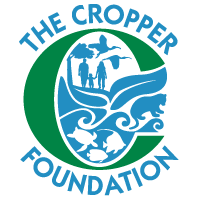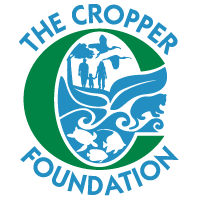The Cropper Foundation is a non-profit organisation based in Trinidad and Tobago, dedicated to advancing informed and inclusive decision-making for sustainable development. For almost 25 years, the foundation has been at the forefront of efforts to ensure that nature and the environment are integral to how development is understood and approached by decision-makers and communities alike.
About us
About The Cropper Foundation
Our Mission
The foundation’s work is driven by the belief that sustainable development must include everyone and everything—from policymakers to private citizens, and from academia to the private sector. At the heart of its mission is the idea that nature is everyone’s business, and its stewardship is essential for a thriving future.
What We Do
The Cropper Foundation bridges gaps between sectors to foster collaboration and create sustainable solutions. Over the years, the foundation has:
- Partnered with policymakers to integrate environmental considerations into decision-making.
- Engaged with academia and civil society to foster research and advocacy for sustainability.
- Recently expanded to include the private sector as a vital partner, recognising that the trajectory of sustainability requires participation from all.
By providing technical expertise, fostering partnerships, and guiding processes, the foundation ensures that development is informed by a holistic understanding of nature, equity, and community resilience.
Why It Matters
We all exist within nature, and sustainable development cannot happen without recognising this interdependence. The Cropper Foundation’s work emphasises that sustainable decisions benefit everyone—individuals, organisations, and the environment.
Through nearly a quarter-century of innovation, collaboration, and impact, the Cropper Foundation remains committed to creating a future where development respects and preserves the natural world, ensuring a better quality of life for all.
Our Philosophy
Human development is about creating an environment in which people are provided the opportunity to develop their full potential and lead productive, creative lives in accordance with their needs and interests. It also has to do with providing the space and opportunity for people to enlarge their choices.
Since 2000, this understanding has driven the Foundation to network with likeminded individuals and organizations to influence development policy and practice locally, regionally and globally so that issues like socio-economic development, equity, concern for the environment, disaster risk reduction and climate change adaptation are addressed not as disconnected activities, but in a holistic manner within the framework of sustainable development.
As our co-founder Angela Cropper says “Our idea was to create a space, a mechanism, that could facilitate others as well to “give something back”. When we see ourselves just as individuals, we feel a little impotent or unequal to the scale of the challenges that are presented to us. But working together creates confidence. There is mutual support, energizing and synergizing. Citizen groups often feel hesitant about commenting on the nature and content of development, and governments may feel it is presumptuous for them to do so.
We come from a society that is still trying to evolve constructive mechanisms for ongoing citizen opinion and input not predicated on partisan politics or political cycles. That’s the role and the road The Cropper Foundation has chosen in seeking to influence the course of our development.”
We are pro-development, but, moreso, we are for responsible development. The core of our activities has to do with the application of research and analysis to provide the evidence for informed decision and action. We are also committed to advocacy and action in helping to remove barriers that inhibit dialogue and partnership across people and institutions: the several agencies of the state; the central and local government authorities; and between the public and private sectors and civil society.
We know that coordination, cooperation, collaboration and not compartmentalization are the keys to unlock the potential of small island developing states, like those in the Caribbean.
How we work
Our Themes
Human Well-Being is impacted by a multitude of drivers which inform themes that the work of the Foundation explores through its work. Individual themes may form the basis of projects as the need arises, or a theme(s) can be addressed within the design and implementation of projects under the core programme areas.
Natural Capital
Data for Development
Education for Sustainable Development
Civil Society Leadership
Sustainability Financing
We’ve got an amazing team
Our Staff

He brings significant experience in the field of development and sustainability education and management, having served as the National Coordinator of the UNESCO Schools Network, leading national and regional efforts at sustainability and diversity in education. As an education programme consultant, facilitator and invited expert, he has contributed to key initiatives such as UNESCO’s global programme on bullying and school violence and UNESCO’s Caribbean climate change education agenda; Curriculum development for countering extremism in the Americas; and national whole school approaches on mainstreaming the Sustainable Development Goals.
Omar is deeply interested on how and why people work together and communicate, especially towards common goals and particularly in civil society. Chasing these interests, he has worked on development communication and development management projects as a consultant with the University of the West Indies, various United Nations Agencies and other National Civil Society Organisations. In addition, he has sought to enrich his own experience and others through his tenure as a member of the International Union for the Conservation of Nature’s Commission on Education and Communication; Advisory Board member of the Youth of the UN Group of Trinidad and Tobago; Fellow of the International Professors Project; and a Director of CAISO: Sex & Gender Justice.
He has a BSc in Environmental and Natural Resource Management (U.W.I.) and a Masters - Business Administration (Innovation) with professional certification in Project Management, Environmental Human Rights and Climate Change Communication. He is also currently a student of the 10th cohort of the Master of Studies (MSt) in Sustainability Leadership at the University of Cambridge.

Born in Italy and growing up in the Netherlands, her approach is culturally conscious and includes gap- and power dynamics analysis to promote inclusive sustainable development
Caterina has a Master of Arts M.A. /Doctoraal diploma in Cultural Anthropology & Development Sociology from the University of Leiden and is fluent in English, Italian, Dutch, Spanish and French.



In 2015 he was the recipient of a prestigious Yale Research Fellowship in directing and in 2016 co-founded Tout Moun Productions, a theatre company that focuses on assisting literature and theatre students through the dramatization and clarification of circular material through educative theatre.
In 2019 Waldron, alongside practitioner Albert Smith introduced the Micro Theatre format to Trinidad and Tobago stemming the Venezuelan Migrant Crisis and co-founded the organization Micro-theatre Festival of Trinidad and Tobago (MTFTT).
Notwithstanding these interests, Marcus is also a senior contributor to the Traditional Mas Archive: a free online resource in the preservation, personalization and performance of traditional culture founded by Broadway actor Dylan Paul.

Board of Trustees
The Cropper Foundation is governed by a Board of Trustees, appointed at Annual General Meetings. The Trustees are responsible for oversight of the policy, programmatic and management operations of The Foundation. The Board of Trustees comprise persons selected due to their reputation, expertise and commitment to the ideals of TCF.










He worked as an Environmental Economist with the United Nations Environment Programme (UNEP), the University of the West Indies (UWI) and The Cropper Foundation under the UNEP Global flagship Project ProEcoServ (The Project for Ecosystem Services) between the years 2011-2014. Under this project, he evaluated the economic contribution of ecosystem services, such as flood prevention, pollination and water provision, in terms of valuable dollars and cents to T&T’s bottom line. He has presented his research and work under this project at the annual TEEB (The Economics of Ecosystem and Biodiversity, a UN initiative), at the United Nations Forum for Forest SIDS conference, at the Eco-Balance Conference and to multiple ministers, stakeholders, academics and communities. Between 2015-2019 Alexander Served as the Programme Coordinator of the Caribbean Sea Commission (CSC) of the Association of Caribbean States (ACS).
Currently he is working with the Organisation of Eastern Caribbean States to develop a Green-Blue Economy Strategy and Action Plan. He also works with the UNEP WCMC on Grenada’s National ecosystem assessment, by building the capacity of communities to conduct basic valuation of ecosystem services to improve communication on Ecosystem value and support advocacy for environmental protection.

